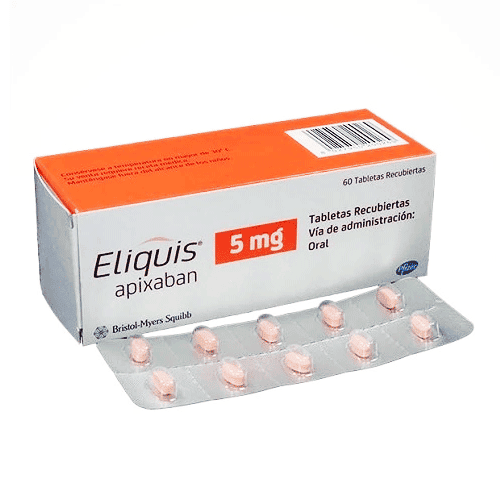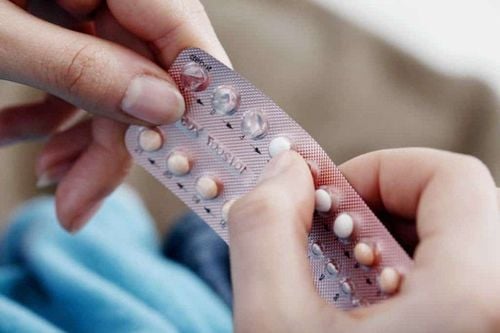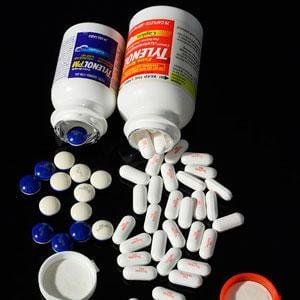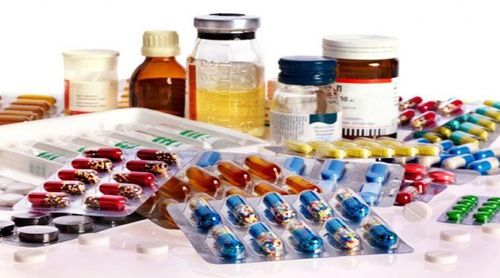This article was written by Nguyen Hoang Phuong Khanh - MSc, Pharmacist - Clinical Pharmacist - Pharmacy Department - Vinmec Central Park International General Hospital.
Apixaban is indicated for the prevention of stroke and embolism in patients with nonvalvular atrial fibrillation, treatment of deep vein thrombosis and pulmonary embolism, and prevention of venous thrombosis in patients undergoing knee or hip replacement surgery. For effective and safe use of the drug, patients need to follow the directions given by their doctor or pharmacist.
1. What are the effects of Apixaban?
Apixaban (brand name Eliquis®) is one of the new-generation oral anticoagulants. Compared to warfarin, it has similar efficacy and a lower rate of bleeding, especially cerebral hemorrhage. New-generation oral anticoagulants have a relatively wide therapeutic range and do not require regular laboratory monitoring to adjust the dose to ensure effectiveness and limit side effects. In addition, the drug has fewer interactions with other medications and requires almost no dietary restrictions like vitamin K antagonists.
Apixaban is indicated for:
- Prevention of stroke and embolism in patients with nonvalvular atrial fibrillation (atrial fibrillation is a common rhythm disorder).
- Treatment of deep vein thrombosis and pulmonary embolism.
- It is indicated to prevent venous thrombosis in patients undergoing knee or hip replacement surgery.
However, one important point to note is that the drug should not be used to prevent thrombosis after patients have undergone artificial heart valve replacement (mechanical or biological valves), LVAD, or TAVR, as it may cause some side effects. Therefore, if a patient has a history of artificial heart valve replacement, they need to inform their doctor to ensure the most appropriate medication is chosen.
2. How to use Apixaban
Take Apixaban as prescribed by your doctor. Do not increase or decrease the dose or stop taking the medication without your doctor's advice.
If the patient cannot swallow the whole tablet, the tablet can be crushed and dissolved in 60ml of water (sugar water or apple juice). The medicine should be taken immediately after mixing.
If the patient wants to switch to another oral anticoagulant, they need to contact their doctor.
The medicine should be taken at the same time each day. If you forget to take your medicine within 6 hours, you can take one tablet and continue with the next dose. If it has been more than 6 hours, you should skip the missed dose, wait for the next scheduled dose, and take only one tablet. Do not take a double dose.
Forgetting to take the medicine increases the risk of blood clot formation, so ensure you always have enough medicine at home.

3. What are the side effects to watch out for?
All anticoagulants increase the risk of bleeding. Bleeding symptoms can be mild or severe, for example:
- Mild symptoms include signs of minor bleeding that stops quickly, such as nosebleeds, bleeding gums (you should choose a soft bristle toothbrush), and small bruises under the skin.
- More severe symptoms require you to contact your doctor: Pale skin, feeling very weak, tired, shortness of breath, chest pain; vomiting blood or passing tarry, red, or foul-smelling stools; prolonged bleeding during menstruation; any other bleeding that takes a long time to stop; etc.
- To reduce the risk of bleeding, you should limit contact with sharp objects such as sharp knives and razors. Limit activities that can easily cause bleeding injuries such as climbing and running.
In case of forgetting to take the medicine for a long time, you are at risk of blood clots or stroke. Inform your doctor if you experience the following symptoms:
- Lung signs: Chest pain, tachycardia, shortness of breath, fever.
- Signs in the arms or legs: Sudden pain, hot swelling, tightness.
- Stroke signs: Slurred speech - inability to speak, facial weakness, weakness on one side of the body.
If you need surgery or procedures related to bleeding such as tooth extraction or spinal interventions, inform the medical staff that you are using anticoagulants so that doctors can consider stopping the medication if necessary.
Inform your doctor if you are planning to become pregnant while taking the medication or are breastfeeding.
4. Foods and medications to avoid when using Apixaban
- Certain medications can affect Apixaban levels, such as Carbamazepine, Itraconazole, Ketoconazole, Phenytoin, Rifampin, Ritonavir, or supplements containing St. John’s wort. Tell your doctor if you are taking these medications.
- Antiplatelet drugs (Aspirin, Clopidogrel, Ticagrelor...); non-steroidal anti-inflammatory pain relievers (Ibuprofen, Diclofenac...); and SSRI antidepressants can all increase the risk of bleeding when taken together. Therefore, you should consult your doctor before using any other medication, including supplements and traditional medicine.
- Limit consumption of alcoholic beverages.
- You do not need regular blood tests to monitor Apixaban levels.
- Apixaban is minimally excreted through the kidneys, so kidney function should be monitored at least once a year. For patients with impaired kidney function, frequent monitoring may be necessary to adjust the dosage.
- Consult your doctor if you have liver dysfunction.
In summary, apixaban is indicated for the prevention of stroke and embolism in patients with nonvalvular atrial fibrillation, for the treatment of deep vein thrombosis and pulmonary embolism, and for the prevention of venous thromboembolism in patients undergoing knee or hip replacement surgery.
To arrange an appointment, please call HOTLINE or make your reservation directly HERE. You may also download the MyVinmec app to schedule appointments faster and manage your reservations more conveniently.








